Strategies for Internationalization of Agricultural SMEs
VerifiedAdded on 2019/09/20
|10
|2459
|268
Report
AI Summary
This report presents a data analysis of internationalization strategies and barriers faced by Nigerian agricultural SMEs. The research, based on a survey of 10 agricultural businesses, employs thematic analysis to identify key themes such as profitability in the local market, factors contributing to successful internationalization, potential and strategies for internationalization, and barriers encountered. The findings reveal that while SMEs recognize the potential of internationalization for growth, they face challenges including lack of knowledge on international customer demands, inadequate infrastructure, and financial constraints. Exporting is identified as a primary internationalization strategy, with e-commerce gaining traction. The report concludes by highlighting areas for improvement, such as infrastructure upgrades, technological advancements, and innovative strategies, while also emphasizing the benefits of internationalization for organizational growth and job creation. The research provides valuable insights into the current state and future prospects of internationalization for Nigerian agricultural SMEs.
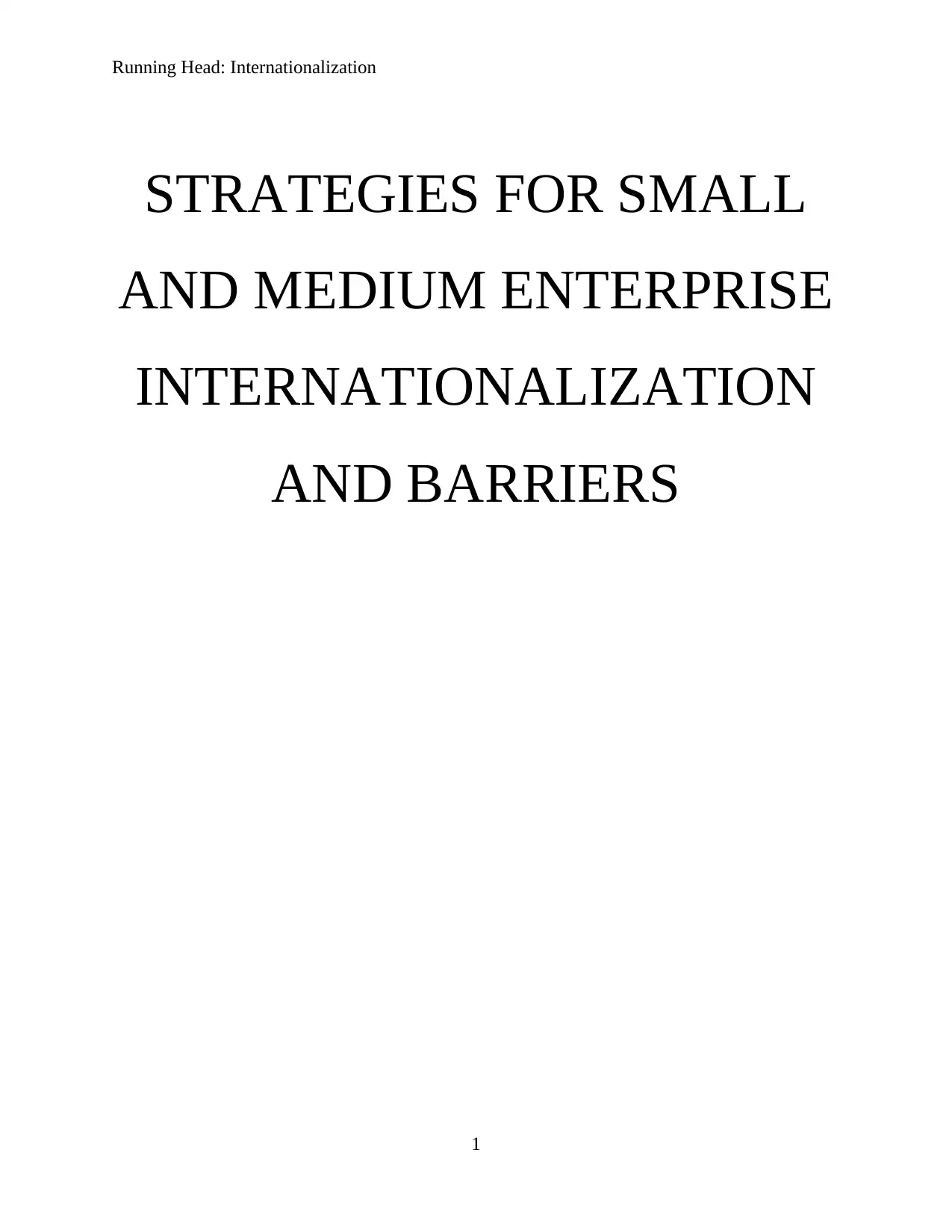
Running Head: Internationalization
STRATEGIES FOR SMALL
AND MEDIUM ENTERPRISE
INTERNATIONALIZATION
AND BARRIERS
1
STRATEGIES FOR SMALL
AND MEDIUM ENTERPRISE
INTERNATIONALIZATION
AND BARRIERS
1
Paraphrase This Document
Need a fresh take? Get an instant paraphrase of this document with our AI Paraphraser
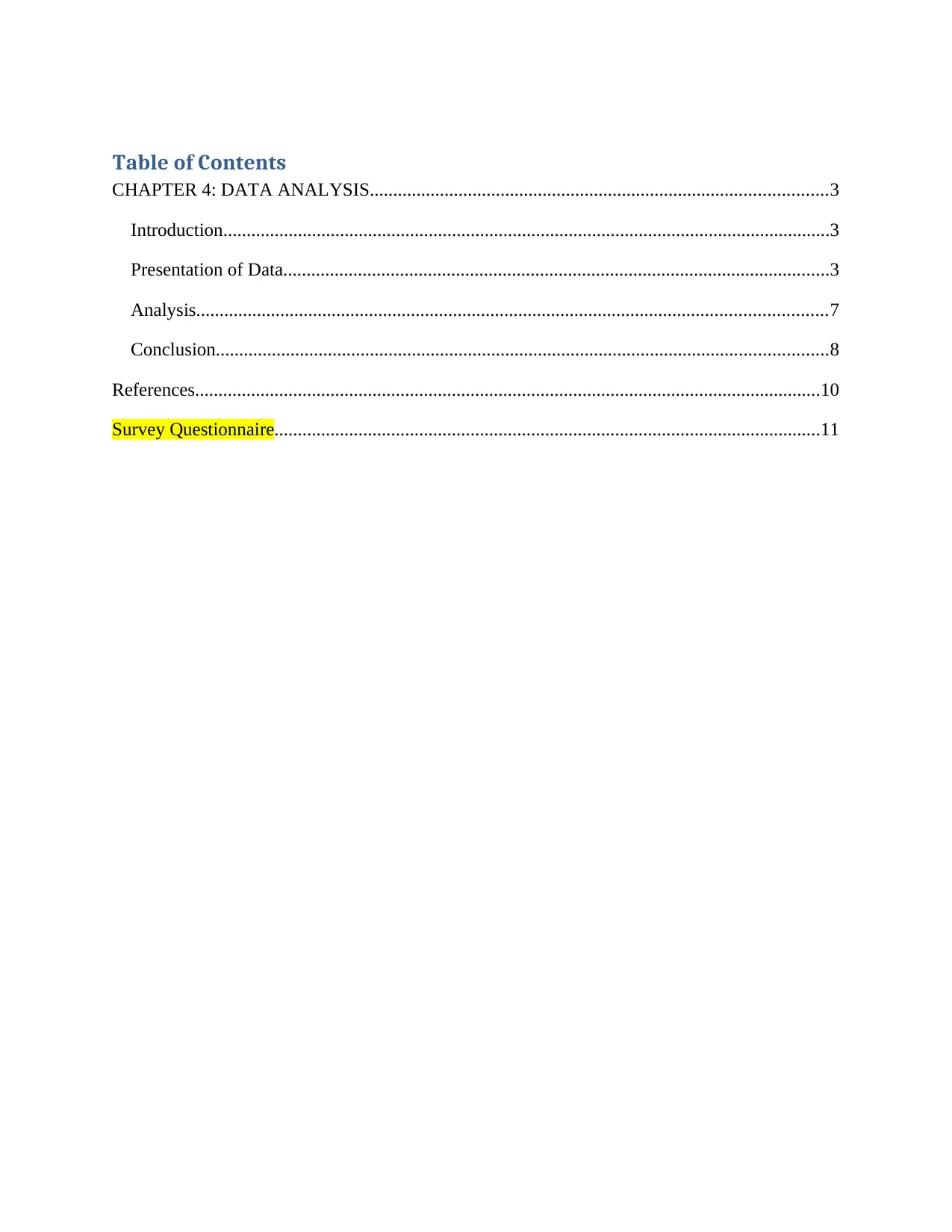
Table of Contents
CHAPTER 4: DATA ANALYSIS..................................................................................................3
Introduction..................................................................................................................................3
Presentation of Data.....................................................................................................................3
Analysis.......................................................................................................................................7
Conclusion...................................................................................................................................8
References......................................................................................................................................10
Survey Questionnaire.....................................................................................................................11
CHAPTER 4: DATA ANALYSIS..................................................................................................3
Introduction..................................................................................................................................3
Presentation of Data.....................................................................................................................3
Analysis.......................................................................................................................................7
Conclusion...................................................................................................................................8
References......................................................................................................................................10
Survey Questionnaire.....................................................................................................................11
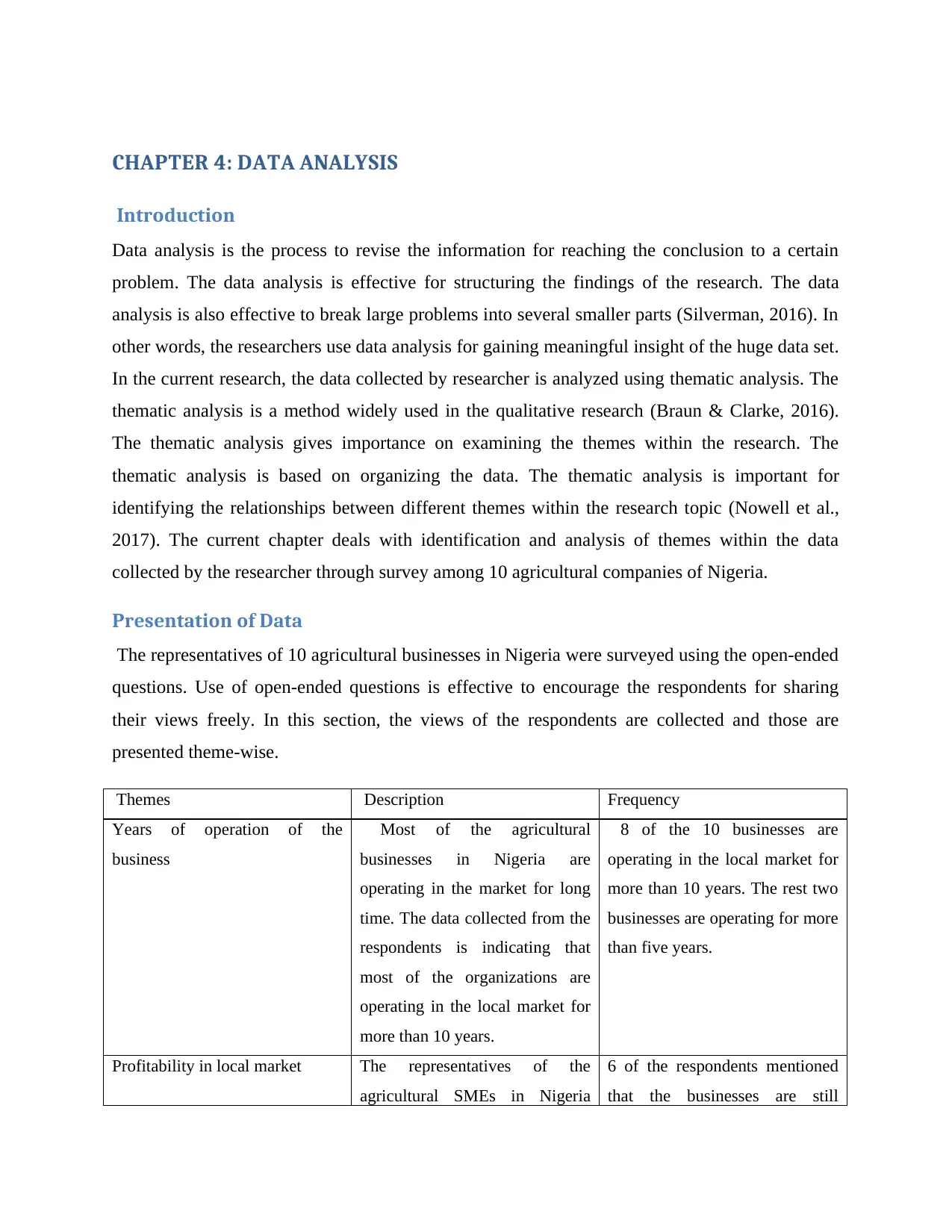
CHAPTER 4: DATA ANALYSIS
Introduction
Data analysis is the process to revise the information for reaching the conclusion to a certain
problem. The data analysis is effective for structuring the findings of the research. The data
analysis is also effective to break large problems into several smaller parts (Silverman, 2016). In
other words, the researchers use data analysis for gaining meaningful insight of the huge data set.
In the current research, the data collected by researcher is analyzed using thematic analysis. The
thematic analysis is a method widely used in the qualitative research (Braun & Clarke, 2016).
The thematic analysis gives importance on examining the themes within the research. The
thematic analysis is based on organizing the data. The thematic analysis is important for
identifying the relationships between different themes within the research topic (Nowell et al.,
2017). The current chapter deals with identification and analysis of themes within the data
collected by the researcher through survey among 10 agricultural companies of Nigeria.
Presentation of Data
The representatives of 10 agricultural businesses in Nigeria were surveyed using the open-ended
questions. Use of open-ended questions is effective to encourage the respondents for sharing
their views freely. In this section, the views of the respondents are collected and those are
presented theme-wise.
Themes Description Frequency
Years of operation of the
business
Most of the agricultural
businesses in Nigeria are
operating in the market for long
time. The data collected from the
respondents is indicating that
most of the organizations are
operating in the local market for
more than 10 years.
8 of the 10 businesses are
operating in the local market for
more than 10 years. The rest two
businesses are operating for more
than five years.
Profitability in local market The representatives of the
agricultural SMEs in Nigeria
6 of the respondents mentioned
that the businesses are still
Introduction
Data analysis is the process to revise the information for reaching the conclusion to a certain
problem. The data analysis is effective for structuring the findings of the research. The data
analysis is also effective to break large problems into several smaller parts (Silverman, 2016). In
other words, the researchers use data analysis for gaining meaningful insight of the huge data set.
In the current research, the data collected by researcher is analyzed using thematic analysis. The
thematic analysis is a method widely used in the qualitative research (Braun & Clarke, 2016).
The thematic analysis gives importance on examining the themes within the research. The
thematic analysis is based on organizing the data. The thematic analysis is important for
identifying the relationships between different themes within the research topic (Nowell et al.,
2017). The current chapter deals with identification and analysis of themes within the data
collected by the researcher through survey among 10 agricultural companies of Nigeria.
Presentation of Data
The representatives of 10 agricultural businesses in Nigeria were surveyed using the open-ended
questions. Use of open-ended questions is effective to encourage the respondents for sharing
their views freely. In this section, the views of the respondents are collected and those are
presented theme-wise.
Themes Description Frequency
Years of operation of the
business
Most of the agricultural
businesses in Nigeria are
operating in the market for long
time. The data collected from the
respondents is indicating that
most of the organizations are
operating in the local market for
more than 10 years.
8 of the 10 businesses are
operating in the local market for
more than 10 years. The rest two
businesses are operating for more
than five years.
Profitability in local market The representatives of the
agricultural SMEs in Nigeria
6 of the respondents mentioned
that the businesses are still
⊘ This is a preview!⊘
Do you want full access?
Subscribe today to unlock all pages.

Trusted by 1+ million students worldwide
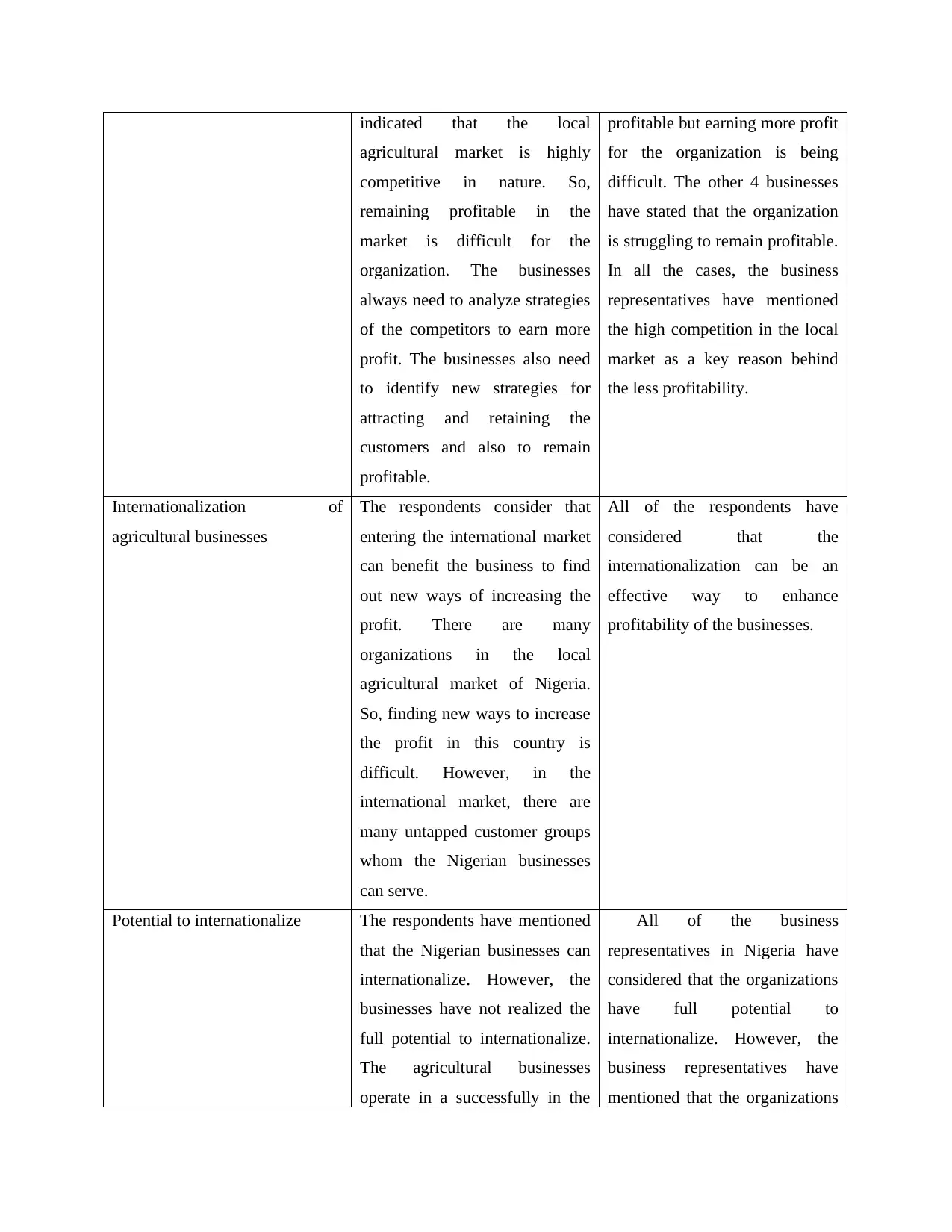
indicated that the local
agricultural market is highly
competitive in nature. So,
remaining profitable in the
market is difficult for the
organization. The businesses
always need to analyze strategies
of the competitors to earn more
profit. The businesses also need
to identify new strategies for
attracting and retaining the
customers and also to remain
profitable.
profitable but earning more profit
for the organization is being
difficult. The other 4 businesses
have stated that the organization
is struggling to remain profitable.
In all the cases, the business
representatives have mentioned
the high competition in the local
market as a key reason behind
the less profitability.
Internationalization of
agricultural businesses
The respondents consider that
entering the international market
can benefit the business to find
out new ways of increasing the
profit. There are many
organizations in the local
agricultural market of Nigeria.
So, finding new ways to increase
the profit in this country is
difficult. However, in the
international market, there are
many untapped customer groups
whom the Nigerian businesses
can serve.
All of the respondents have
considered that the
internationalization can be an
effective way to enhance
profitability of the businesses.
Potential to internationalize The respondents have mentioned
that the Nigerian businesses can
internationalize. However, the
businesses have not realized the
full potential to internationalize.
The agricultural businesses
operate in a successfully in the
All of the business
representatives in Nigeria have
considered that the organizations
have full potential to
internationalize. However, the
business representatives have
mentioned that the organizations
agricultural market is highly
competitive in nature. So,
remaining profitable in the
market is difficult for the
organization. The businesses
always need to analyze strategies
of the competitors to earn more
profit. The businesses also need
to identify new strategies for
attracting and retaining the
customers and also to remain
profitable.
profitable but earning more profit
for the organization is being
difficult. The other 4 businesses
have stated that the organization
is struggling to remain profitable.
In all the cases, the business
representatives have mentioned
the high competition in the local
market as a key reason behind
the less profitability.
Internationalization of
agricultural businesses
The respondents consider that
entering the international market
can benefit the business to find
out new ways of increasing the
profit. There are many
organizations in the local
agricultural market of Nigeria.
So, finding new ways to increase
the profit in this country is
difficult. However, in the
international market, there are
many untapped customer groups
whom the Nigerian businesses
can serve.
All of the respondents have
considered that the
internationalization can be an
effective way to enhance
profitability of the businesses.
Potential to internationalize The respondents have mentioned
that the Nigerian businesses can
internationalize. However, the
businesses have not realized the
full potential to internationalize.
The agricultural businesses
operate in a successfully in the
All of the business
representatives in Nigeria have
considered that the organizations
have full potential to
internationalize. However, the
business representatives have
mentioned that the organizations
Paraphrase This Document
Need a fresh take? Get an instant paraphrase of this document with our AI Paraphraser
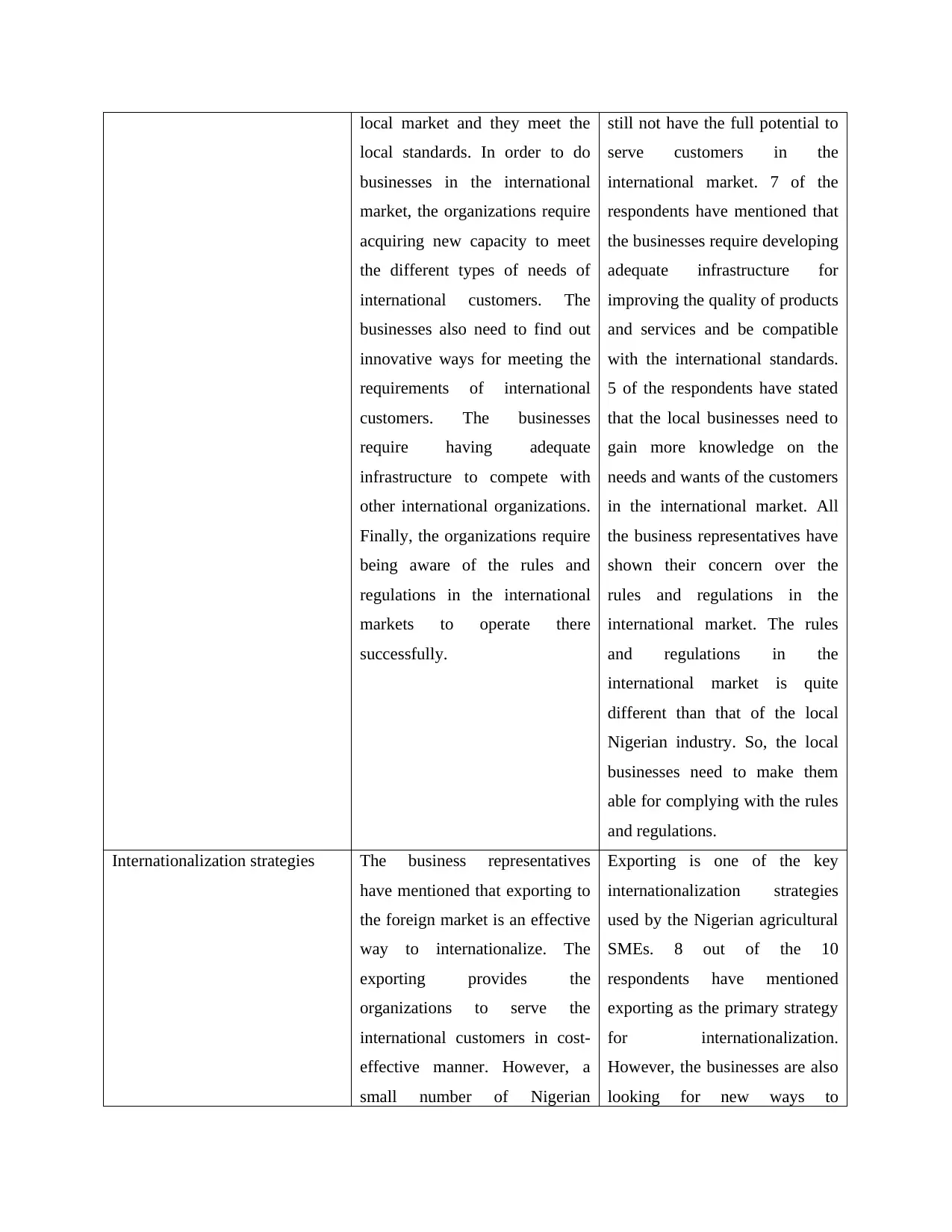
local market and they meet the
local standards. In order to do
businesses in the international
market, the organizations require
acquiring new capacity to meet
the different types of needs of
international customers. The
businesses also need to find out
innovative ways for meeting the
requirements of international
customers. The businesses
require having adequate
infrastructure to compete with
other international organizations.
Finally, the organizations require
being aware of the rules and
regulations in the international
markets to operate there
successfully.
still not have the full potential to
serve customers in the
international market. 7 of the
respondents have mentioned that
the businesses require developing
adequate infrastructure for
improving the quality of products
and services and be compatible
with the international standards.
5 of the respondents have stated
that the local businesses need to
gain more knowledge on the
needs and wants of the customers
in the international market. All
the business representatives have
shown their concern over the
rules and regulations in the
international market. The rules
and regulations in the
international market is quite
different than that of the local
Nigerian industry. So, the local
businesses need to make them
able for complying with the rules
and regulations.
Internationalization strategies The business representatives
have mentioned that exporting to
the foreign market is an effective
way to internationalize. The
exporting provides the
organizations to serve the
international customers in cost-
effective manner. However, a
small number of Nigerian
Exporting is one of the key
internationalization strategies
used by the Nigerian agricultural
SMEs. 8 out of the 10
respondents have mentioned
exporting as the primary strategy
for internationalization.
However, the businesses are also
looking for new ways to
local standards. In order to do
businesses in the international
market, the organizations require
acquiring new capacity to meet
the different types of needs of
international customers. The
businesses also need to find out
innovative ways for meeting the
requirements of international
customers. The businesses
require having adequate
infrastructure to compete with
other international organizations.
Finally, the organizations require
being aware of the rules and
regulations in the international
markets to operate there
successfully.
still not have the full potential to
serve customers in the
international market. 7 of the
respondents have mentioned that
the businesses require developing
adequate infrastructure for
improving the quality of products
and services and be compatible
with the international standards.
5 of the respondents have stated
that the local businesses need to
gain more knowledge on the
needs and wants of the customers
in the international market. All
the business representatives have
shown their concern over the
rules and regulations in the
international market. The rules
and regulations in the
international market is quite
different than that of the local
Nigerian industry. So, the local
businesses need to make them
able for complying with the rules
and regulations.
Internationalization strategies The business representatives
have mentioned that exporting to
the foreign market is an effective
way to internationalize. The
exporting provides the
organizations to serve the
international customers in cost-
effective manner. However, a
small number of Nigerian
Exporting is one of the key
internationalization strategies
used by the Nigerian agricultural
SMEs. 8 out of the 10
respondents have mentioned
exporting as the primary strategy
for internationalization.
However, the businesses are also
looking for new ways to
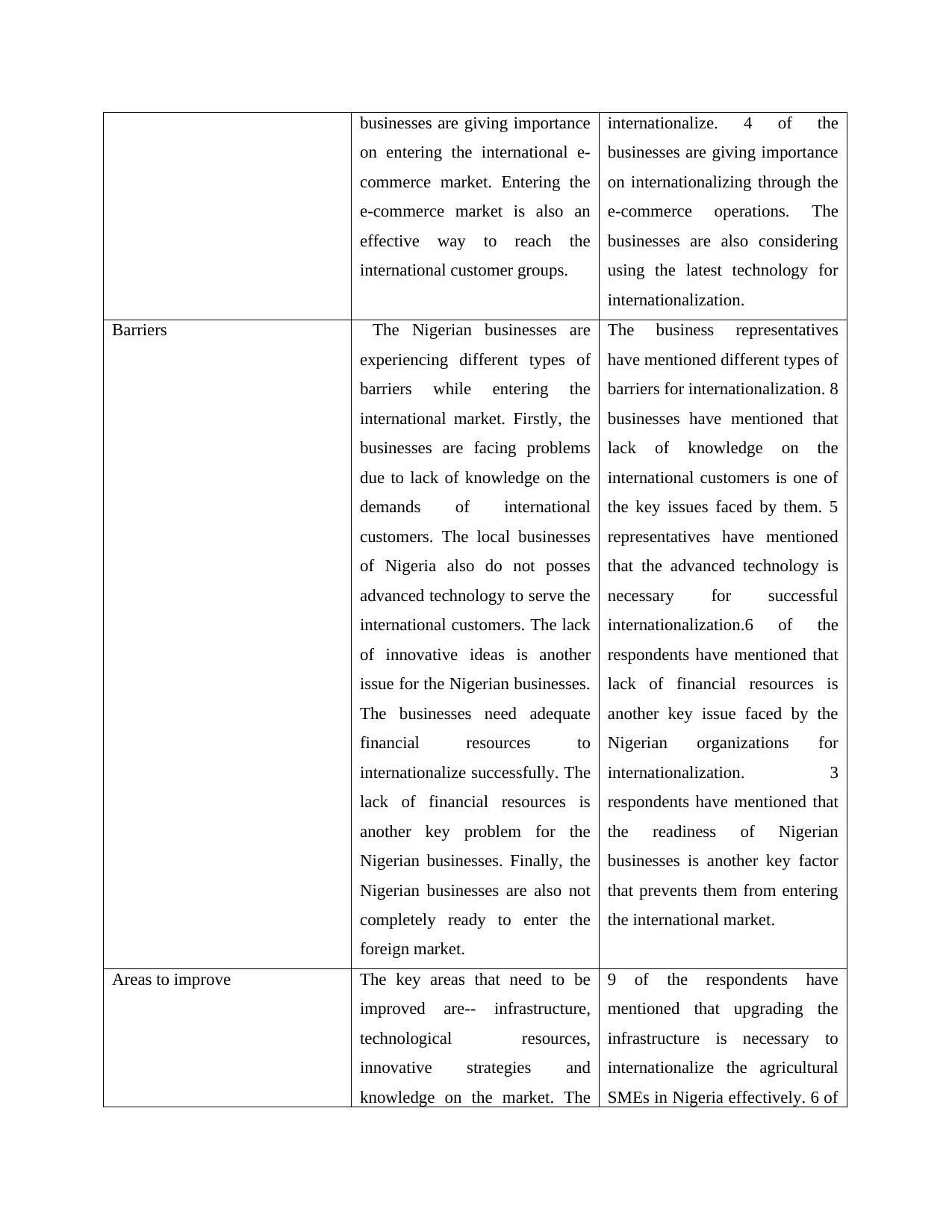
businesses are giving importance
on entering the international e-
commerce market. Entering the
e-commerce market is also an
effective way to reach the
international customer groups.
internationalize. 4 of the
businesses are giving importance
on internationalizing through the
e-commerce operations. The
businesses are also considering
using the latest technology for
internationalization.
Barriers The Nigerian businesses are
experiencing different types of
barriers while entering the
international market. Firstly, the
businesses are facing problems
due to lack of knowledge on the
demands of international
customers. The local businesses
of Nigeria also do not posses
advanced technology to serve the
international customers. The lack
of innovative ideas is another
issue for the Nigerian businesses.
The businesses need adequate
financial resources to
internationalize successfully. The
lack of financial resources is
another key problem for the
Nigerian businesses. Finally, the
Nigerian businesses are also not
completely ready to enter the
foreign market.
The business representatives
have mentioned different types of
barriers for internationalization. 8
businesses have mentioned that
lack of knowledge on the
international customers is one of
the key issues faced by them. 5
representatives have mentioned
that the advanced technology is
necessary for successful
internationalization.6 of the
respondents have mentioned that
lack of financial resources is
another key issue faced by the
Nigerian organizations for
internationalization. 3
respondents have mentioned that
the readiness of Nigerian
businesses is another key factor
that prevents them from entering
the international market.
Areas to improve The key areas that need to be
improved are-- infrastructure,
technological resources,
innovative strategies and
knowledge on the market. The
9 of the respondents have
mentioned that upgrading the
infrastructure is necessary to
internationalize the agricultural
SMEs in Nigeria effectively. 6 of
on entering the international e-
commerce market. Entering the
e-commerce market is also an
effective way to reach the
international customer groups.
internationalize. 4 of the
businesses are giving importance
on internationalizing through the
e-commerce operations. The
businesses are also considering
using the latest technology for
internationalization.
Barriers The Nigerian businesses are
experiencing different types of
barriers while entering the
international market. Firstly, the
businesses are facing problems
due to lack of knowledge on the
demands of international
customers. The local businesses
of Nigeria also do not posses
advanced technology to serve the
international customers. The lack
of innovative ideas is another
issue for the Nigerian businesses.
The businesses need adequate
financial resources to
internationalize successfully. The
lack of financial resources is
another key problem for the
Nigerian businesses. Finally, the
Nigerian businesses are also not
completely ready to enter the
foreign market.
The business representatives
have mentioned different types of
barriers for internationalization. 8
businesses have mentioned that
lack of knowledge on the
international customers is one of
the key issues faced by them. 5
representatives have mentioned
that the advanced technology is
necessary for successful
internationalization.6 of the
respondents have mentioned that
lack of financial resources is
another key issue faced by the
Nigerian organizations for
internationalization. 3
respondents have mentioned that
the readiness of Nigerian
businesses is another key factor
that prevents them from entering
the international market.
Areas to improve The key areas that need to be
improved are-- infrastructure,
technological resources,
innovative strategies and
knowledge on the market. The
9 of the respondents have
mentioned that upgrading the
infrastructure is necessary to
internationalize the agricultural
SMEs in Nigeria effectively. 6 of
⊘ This is a preview!⊘
Do you want full access?
Subscribe today to unlock all pages.

Trusted by 1+ million students worldwide
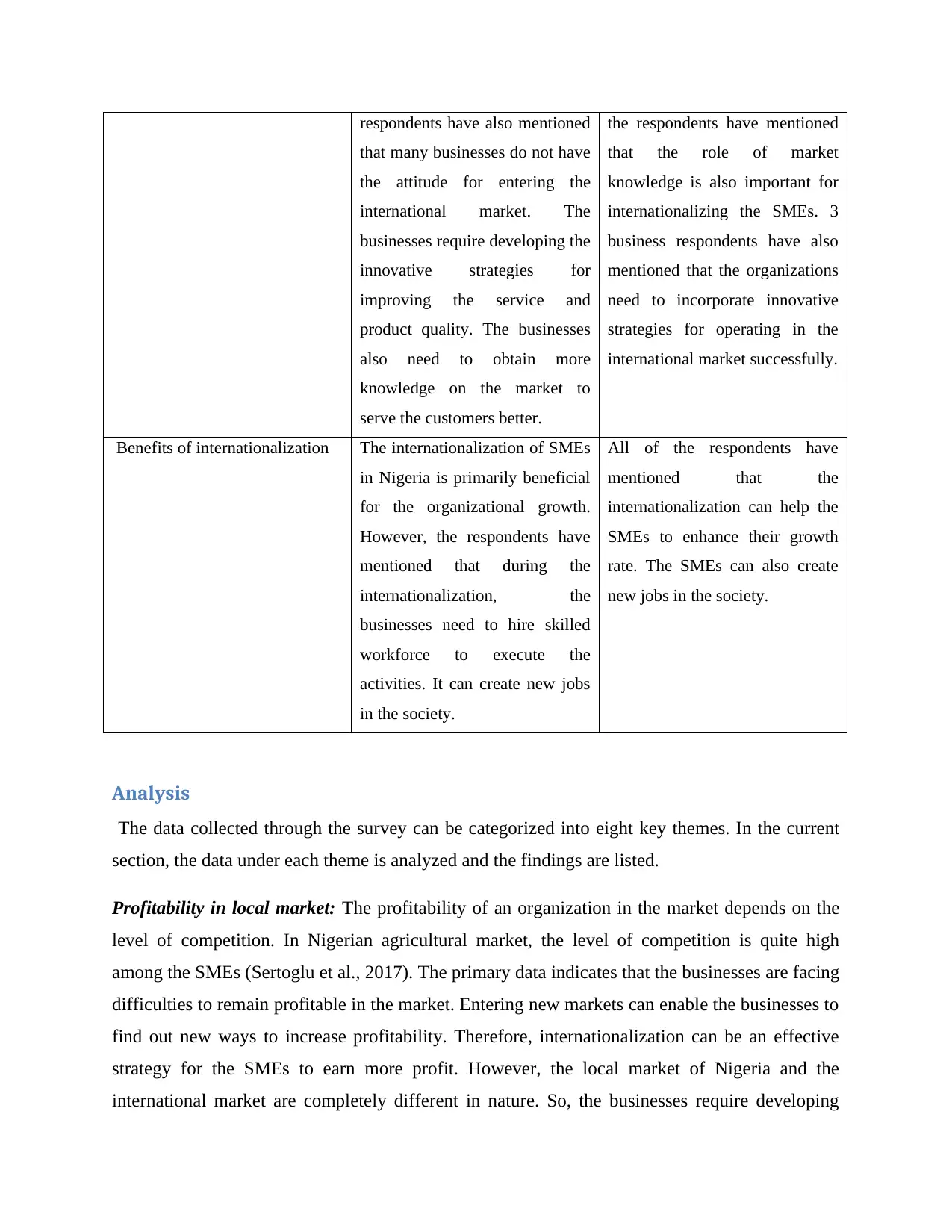
respondents have also mentioned
that many businesses do not have
the attitude for entering the
international market. The
businesses require developing the
innovative strategies for
improving the service and
product quality. The businesses
also need to obtain more
knowledge on the market to
serve the customers better.
the respondents have mentioned
that the role of market
knowledge is also important for
internationalizing the SMEs. 3
business respondents have also
mentioned that the organizations
need to incorporate innovative
strategies for operating in the
international market successfully.
Benefits of internationalization The internationalization of SMEs
in Nigeria is primarily beneficial
for the organizational growth.
However, the respondents have
mentioned that during the
internationalization, the
businesses need to hire skilled
workforce to execute the
activities. It can create new jobs
in the society.
All of the respondents have
mentioned that the
internationalization can help the
SMEs to enhance their growth
rate. The SMEs can also create
new jobs in the society.
Analysis
The data collected through the survey can be categorized into eight key themes. In the current
section, the data under each theme is analyzed and the findings are listed.
Profitability in local market: The profitability of an organization in the market depends on the
level of competition. In Nigerian agricultural market, the level of competition is quite high
among the SMEs (Sertoglu et al., 2017). The primary data indicates that the businesses are facing
difficulties to remain profitable in the market. Entering new markets can enable the businesses to
find out new ways to increase profitability. Therefore, internationalization can be an effective
strategy for the SMEs to earn more profit. However, the local market of Nigeria and the
international market are completely different in nature. So, the businesses require developing
that many businesses do not have
the attitude for entering the
international market. The
businesses require developing the
innovative strategies for
improving the service and
product quality. The businesses
also need to obtain more
knowledge on the market to
serve the customers better.
the respondents have mentioned
that the role of market
knowledge is also important for
internationalizing the SMEs. 3
business respondents have also
mentioned that the organizations
need to incorporate innovative
strategies for operating in the
international market successfully.
Benefits of internationalization The internationalization of SMEs
in Nigeria is primarily beneficial
for the organizational growth.
However, the respondents have
mentioned that during the
internationalization, the
businesses need to hire skilled
workforce to execute the
activities. It can create new jobs
in the society.
All of the respondents have
mentioned that the
internationalization can help the
SMEs to enhance their growth
rate. The SMEs can also create
new jobs in the society.
Analysis
The data collected through the survey can be categorized into eight key themes. In the current
section, the data under each theme is analyzed and the findings are listed.
Profitability in local market: The profitability of an organization in the market depends on the
level of competition. In Nigerian agricultural market, the level of competition is quite high
among the SMEs (Sertoglu et al., 2017). The primary data indicates that the businesses are facing
difficulties to remain profitable in the market. Entering new markets can enable the businesses to
find out new ways to increase profitability. Therefore, internationalization can be an effective
strategy for the SMEs to earn more profit. However, the local market of Nigeria and the
international market are completely different in nature. So, the businesses require developing
Paraphrase This Document
Need a fresh take? Get an instant paraphrase of this document with our AI Paraphraser
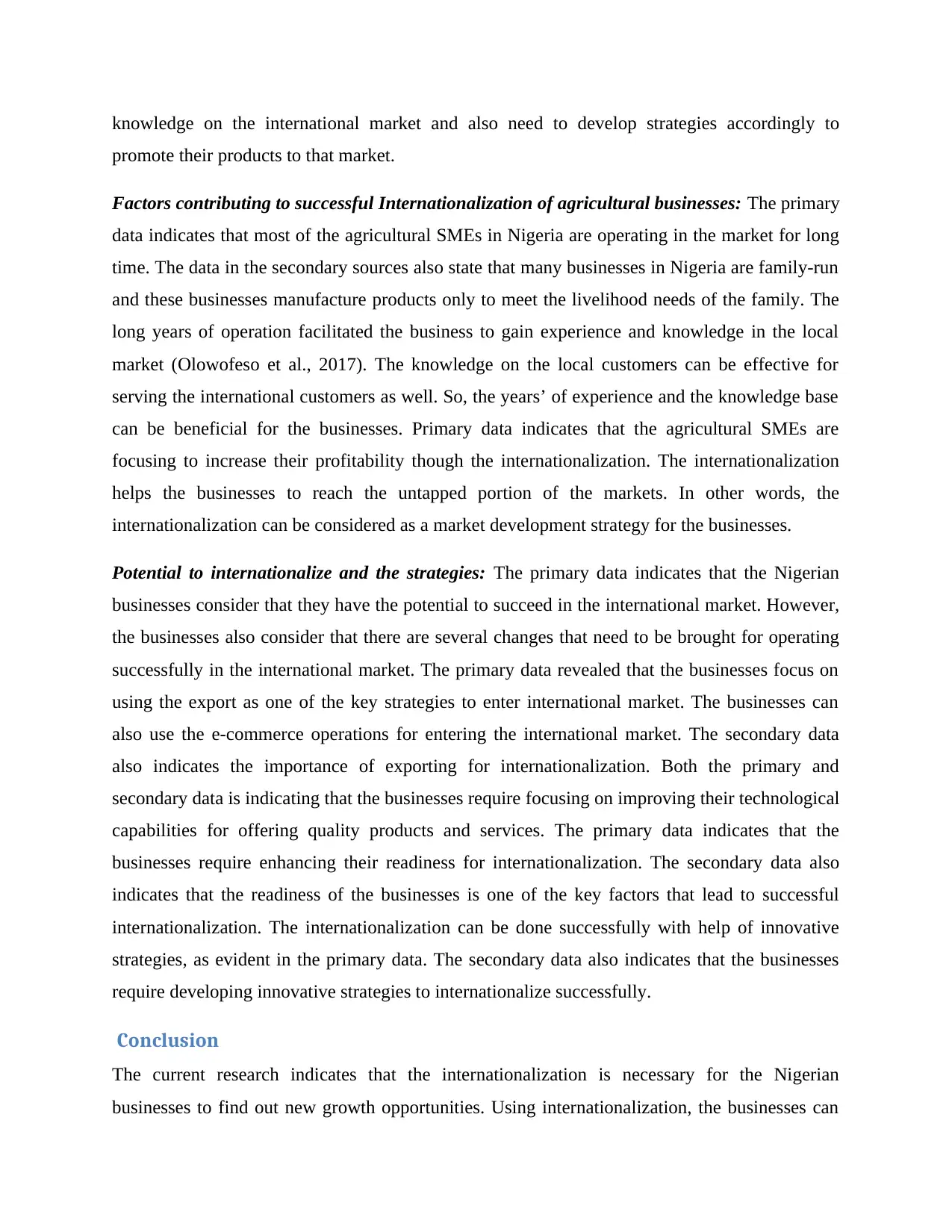
knowledge on the international market and also need to develop strategies accordingly to
promote their products to that market.
Factors contributing to successful Internationalization of agricultural businesses: The primary
data indicates that most of the agricultural SMEs in Nigeria are operating in the market for long
time. The data in the secondary sources also state that many businesses in Nigeria are family-run
and these businesses manufacture products only to meet the livelihood needs of the family. The
long years of operation facilitated the business to gain experience and knowledge in the local
market (Olowofeso et al., 2017). The knowledge on the local customers can be effective for
serving the international customers as well. So, the years’ of experience and the knowledge base
can be beneficial for the businesses. Primary data indicates that the agricultural SMEs are
focusing to increase their profitability though the internationalization. The internationalization
helps the businesses to reach the untapped portion of the markets. In other words, the
internationalization can be considered as a market development strategy for the businesses.
Potential to internationalize and the strategies: The primary data indicates that the Nigerian
businesses consider that they have the potential to succeed in the international market. However,
the businesses also consider that there are several changes that need to be brought for operating
successfully in the international market. The primary data revealed that the businesses focus on
using the export as one of the key strategies to enter international market. The businesses can
also use the e-commerce operations for entering the international market. The secondary data
also indicates the importance of exporting for internationalization. Both the primary and
secondary data is indicating that the businesses require focusing on improving their technological
capabilities for offering quality products and services. The primary data indicates that the
businesses require enhancing their readiness for internationalization. The secondary data also
indicates that the readiness of the businesses is one of the key factors that lead to successful
internationalization. The internationalization can be done successfully with help of innovative
strategies, as evident in the primary data. The secondary data also indicates that the businesses
require developing innovative strategies to internationalize successfully.
Conclusion
The current research indicates that the internationalization is necessary for the Nigerian
businesses to find out new growth opportunities. Using internationalization, the businesses can
promote their products to that market.
Factors contributing to successful Internationalization of agricultural businesses: The primary
data indicates that most of the agricultural SMEs in Nigeria are operating in the market for long
time. The data in the secondary sources also state that many businesses in Nigeria are family-run
and these businesses manufacture products only to meet the livelihood needs of the family. The
long years of operation facilitated the business to gain experience and knowledge in the local
market (Olowofeso et al., 2017). The knowledge on the local customers can be effective for
serving the international customers as well. So, the years’ of experience and the knowledge base
can be beneficial for the businesses. Primary data indicates that the agricultural SMEs are
focusing to increase their profitability though the internationalization. The internationalization
helps the businesses to reach the untapped portion of the markets. In other words, the
internationalization can be considered as a market development strategy for the businesses.
Potential to internationalize and the strategies: The primary data indicates that the Nigerian
businesses consider that they have the potential to succeed in the international market. However,
the businesses also consider that there are several changes that need to be brought for operating
successfully in the international market. The primary data revealed that the businesses focus on
using the export as one of the key strategies to enter international market. The businesses can
also use the e-commerce operations for entering the international market. The secondary data
also indicates the importance of exporting for internationalization. Both the primary and
secondary data is indicating that the businesses require focusing on improving their technological
capabilities for offering quality products and services. The primary data indicates that the
businesses require enhancing their readiness for internationalization. The secondary data also
indicates that the readiness of the businesses is one of the key factors that lead to successful
internationalization. The internationalization can be done successfully with help of innovative
strategies, as evident in the primary data. The secondary data also indicates that the businesses
require developing innovative strategies to internationalize successfully.
Conclusion
The current research indicates that the internationalization is necessary for the Nigerian
businesses to find out new growth opportunities. Using internationalization, the businesses can
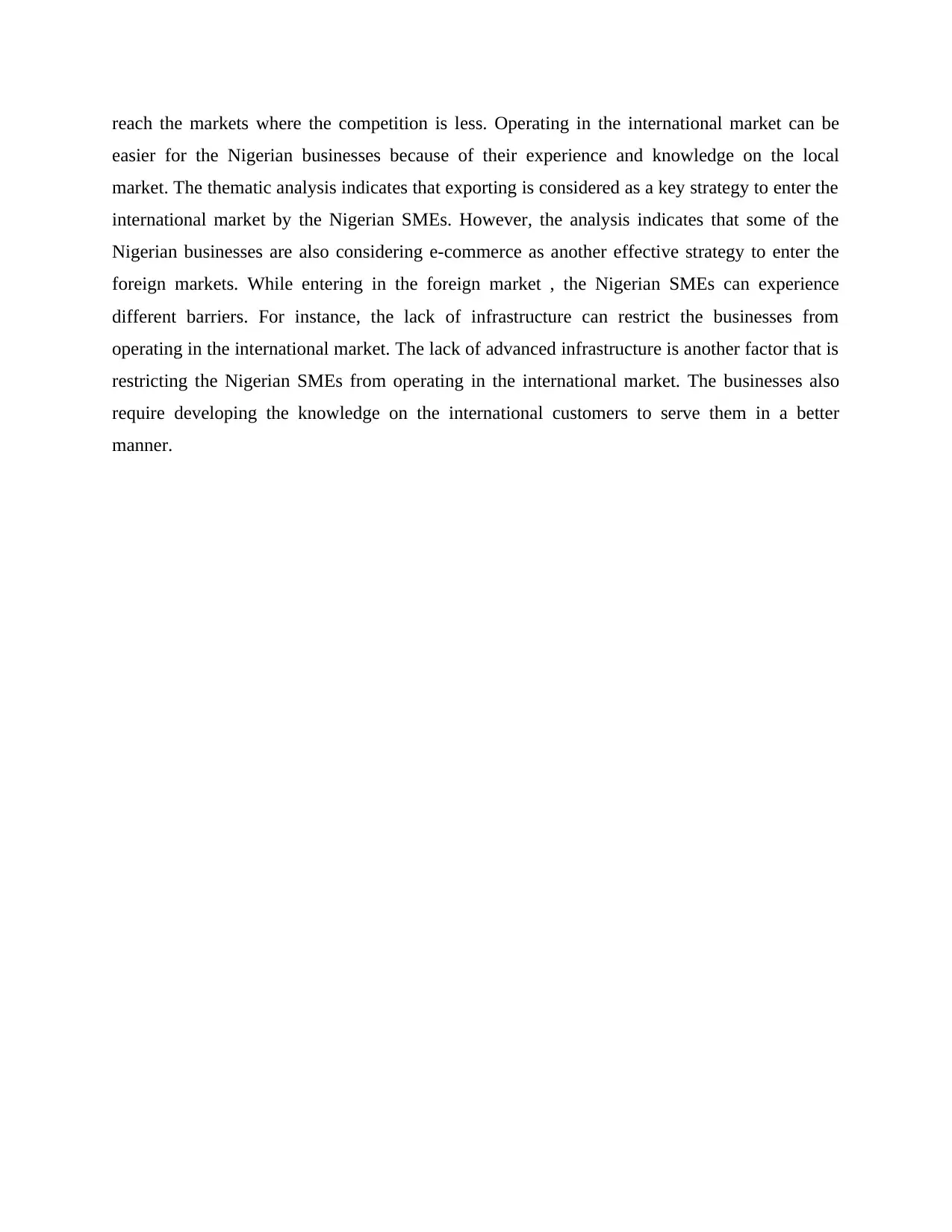
reach the markets where the competition is less. Operating in the international market can be
easier for the Nigerian businesses because of their experience and knowledge on the local
market. The thematic analysis indicates that exporting is considered as a key strategy to enter the
international market by the Nigerian SMEs. However, the analysis indicates that some of the
Nigerian businesses are also considering e-commerce as another effective strategy to enter the
foreign markets. While entering in the foreign market , the Nigerian SMEs can experience
different barriers. For instance, the lack of infrastructure can restrict the businesses from
operating in the international market. The lack of advanced infrastructure is another factor that is
restricting the Nigerian SMEs from operating in the international market. The businesses also
require developing the knowledge on the international customers to serve them in a better
manner.
easier for the Nigerian businesses because of their experience and knowledge on the local
market. The thematic analysis indicates that exporting is considered as a key strategy to enter the
international market by the Nigerian SMEs. However, the analysis indicates that some of the
Nigerian businesses are also considering e-commerce as another effective strategy to enter the
foreign markets. While entering in the foreign market , the Nigerian SMEs can experience
different barriers. For instance, the lack of infrastructure can restrict the businesses from
operating in the international market. The lack of advanced infrastructure is another factor that is
restricting the Nigerian SMEs from operating in the international market. The businesses also
require developing the knowledge on the international customers to serve them in a better
manner.
⊘ This is a preview!⊘
Do you want full access?
Subscribe today to unlock all pages.

Trusted by 1+ million students worldwide
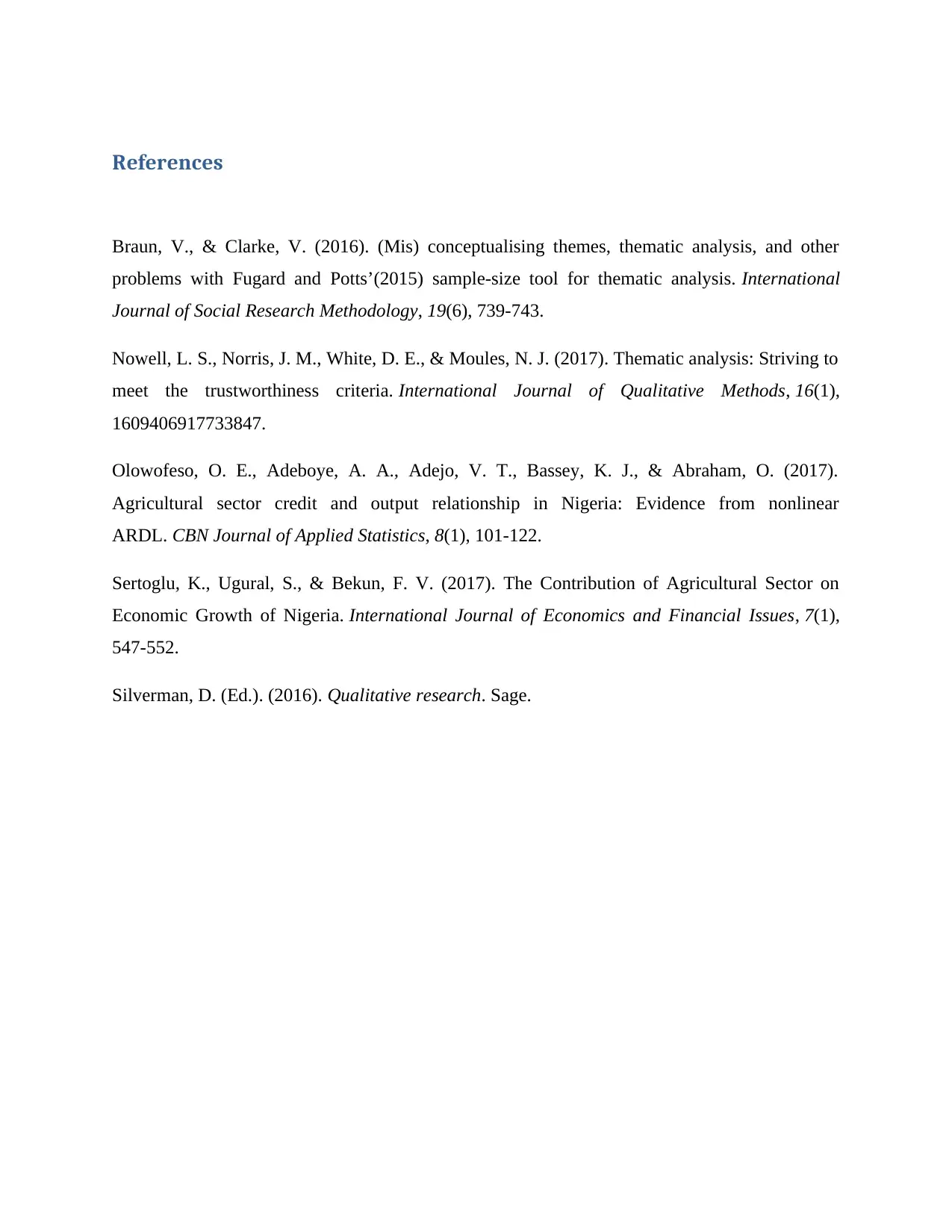
References
Braun, V., & Clarke, V. (2016). (Mis) conceptualising themes, thematic analysis, and other
problems with Fugard and Potts’(2015) sample-size tool for thematic analysis. International
Journal of Social Research Methodology, 19(6), 739-743.
Nowell, L. S., Norris, J. M., White, D. E., & Moules, N. J. (2017). Thematic analysis: Striving to
meet the trustworthiness criteria. International Journal of Qualitative Methods, 16(1),
1609406917733847.
Olowofeso, O. E., Adeboye, A. A., Adejo, V. T., Bassey, K. J., & Abraham, O. (2017).
Agricultural sector credit and output relationship in Nigeria: Evidence from nonlinear
ARDL. CBN Journal of Applied Statistics, 8(1), 101-122.
Sertoglu, K., Ugural, S., & Bekun, F. V. (2017). The Contribution of Agricultural Sector on
Economic Growth of Nigeria. International Journal of Economics and Financial Issues, 7(1),
547-552.
Silverman, D. (Ed.). (2016). Qualitative research. Sage.
Braun, V., & Clarke, V. (2016). (Mis) conceptualising themes, thematic analysis, and other
problems with Fugard and Potts’(2015) sample-size tool for thematic analysis. International
Journal of Social Research Methodology, 19(6), 739-743.
Nowell, L. S., Norris, J. M., White, D. E., & Moules, N. J. (2017). Thematic analysis: Striving to
meet the trustworthiness criteria. International Journal of Qualitative Methods, 16(1),
1609406917733847.
Olowofeso, O. E., Adeboye, A. A., Adejo, V. T., Bassey, K. J., & Abraham, O. (2017).
Agricultural sector credit and output relationship in Nigeria: Evidence from nonlinear
ARDL. CBN Journal of Applied Statistics, 8(1), 101-122.
Sertoglu, K., Ugural, S., & Bekun, F. V. (2017). The Contribution of Agricultural Sector on
Economic Growth of Nigeria. International Journal of Economics and Financial Issues, 7(1),
547-552.
Silverman, D. (Ed.). (2016). Qualitative research. Sage.
1 out of 10
Related Documents
Your All-in-One AI-Powered Toolkit for Academic Success.
+13062052269
info@desklib.com
Available 24*7 on WhatsApp / Email
![[object Object]](/_next/static/media/star-bottom.7253800d.svg)
Unlock your academic potential
Copyright © 2020–2025 A2Z Services. All Rights Reserved. Developed and managed by ZUCOL.





